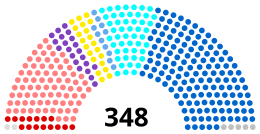Sénat (Second Empire)
|
Senate Sénat |
|
|---|---|
 |
|
| Type | |
| Type |
Upper house of the French Parliament
|
| History | |
| Founded | 1799 |
| Leadership | |
|
Président
|
|
| Structure | |
| Seats | 348 |
 |
|
|
Political groups
|
|
| Elections | |
| Indirect election | |
|
Last election
|
24 September 2017 |
|
Next election
|
September 2020 |
| Meeting place | |
 |
|
| Luxembourg Palace, Paris | |
| Website | |
| www |
|
Coordinates: 48°50′54″N 2°20′14.2″E / 48.84833°N 2.337278°E
The Senate (French: Sénat; pronunciation: [seˈna]) is the upper house of the French Parliament, presided over by a president. Indirectly elected by elected officials, it represents territorial collectivities of the Republic and French citizens living abroad. The Senate enjoys less prominence than the lower house, the directly elected National Assembly; debates in the Senate tend to be less tense and generally receive less media coverage.
The Senate is housed inside the Luxembourg Palace in the 6th arrondissement of Paris, and is guarded by Republican Guards. In front of the building lies the Senate's garden, the Jardin du Luxembourg, open to the public.
France's first experience with an upper house was under the Directory from 1795 to 1799, when the Council of Ancients was the upper chamber. There were Senates in both the First and Second Empires (the former being known as the Sénat conservateur, the latter as the French Senate), but these were only nominally legislative bodies – technically they were not legislative, but rather advisory bodies on the model of the Roman Senate.
...
Wikipedia
